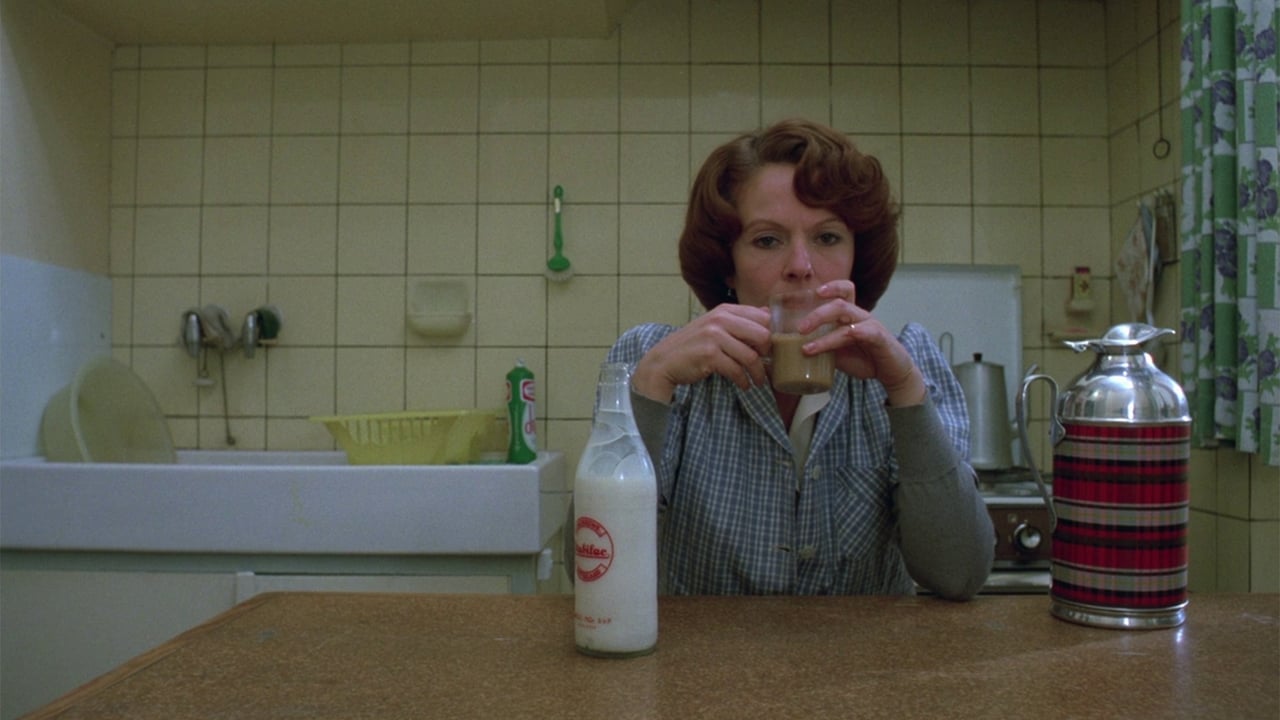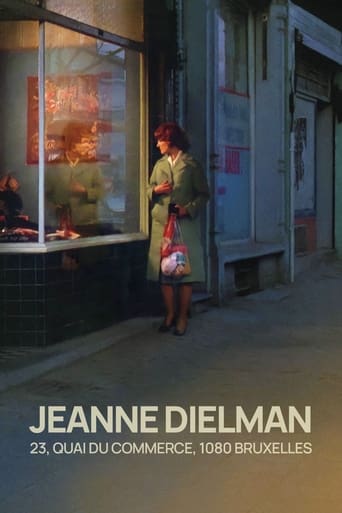

I knew that this was one of the longest films in the book 1001 Movies You Must See Before You Die, at over 3 hours long, I read more about this French film, I thought it was going to be either really boring or really intriguing, I hoped critics giving it five stars out of five would be deserved. Basically Jeanne Dielman (Delphine Seyrig) lives in 23 Commerce Quay, a one-bedroom inner city Brussels flat, she has been widowed for six years, she never really loved her husband and has no intention of remarrying, she wants to concentrate on caring for her teenage son Sylvain (Jan Decorte) and her apartment. The film takes place over three days, with Jeanne spending most of her time doing the household chores, bring particular and meticulous, including preparing and cooking dinner for herself and her son washing up, cleaning surfaces and having a bath. Jeanne occasionally gets out the house to do shopping and to pick something up or drop something off, she also often looks after her neighbour's infant son while the mother runs her errands for the day. But also in her daily routine, which Jeanna sees merely as just another chore, is working as a prostitute, allowing gentlemen clients to come to the apartment, to provide them with whatever sexual pleasure they seek, and when they leave she sticks the money in a savings dish. A few small changes to Jeanne's routine over a thirty-six hour period culminates with an experience she has never had with a client, which affects her psyche, when the man is rested she grabs a pair of scissors, stabbing him to death, following the murder she sits for a long amount of time still and silent. Also starring Henri Storck as the 1st Caller, Jacques Doniol-Valcroze as the 2nd Caller and Yves Bical as the 3rd Caller. Seyrig gives a studied performance as the ordinary woman with an ordinary life, the film is made up of a series of long takes, mostly of the dispassionate normalness of the title character, whether its peeling potatoes or eating without talking, there is nothing exciting, and not much dialogue. The violent climax is worth the wait, I think actually it is the lack of action that makes it much more interesting, the rhythmic repetition of everyday occurrences, an insight into the life of a working mother, and an audacious exploration of bourgeois feminism, a long but most worthwhile art-house drama. Very good!
... View MoreWe are torn in life by emotions, desires, grievances, thoughts that surge through us and back to create self. We suffer from the pull of events outside of us; but we also suffer more acutely it seems from a life that has no pull anymore, from being every day in the same room without air.This is the essence of modern film for me, indeed what sets modern man apart, it's the baring of this self who, having sated apparent needs, finds himself no closer to fulfillment, the walls closing in, the air being sucked out from life. Neorealist characters could at least point around them to a life of squalor and ruin as explanation. But Antonioni's characters?So I'm after filmmakers who abet stillness and the wisdom that comes from it, looking for a cinema of awareness (never aesthetics). Because most movies can splash a bit of passion and noise about our predicaments. But how to achieve cessation? How to inhabit the world and our self in a way that we come finally to a measure of realization about process?Here is one of the simplest suggestions to the question, all about creating emptiness. It's my first acquaintance with this filmmaker and I'm bowled over that she made this at 24. She must have been a brilliant mind, a woman worth knowing.A woman simply goes about her daily life. She's a lonely widowed housewife, doing chores, preparing food, washing the dishes. She's also a prostitute, Akerman makes a point to reveal this at the very beginning. Her son comes back in the afternoon, she prepares dinner. She has to wake up again at dawn to make breakfast and see him off.We have no plot, no drama, and only the interminable life in between. Small rituals like trying to get her coffee right because she has nothing else to do. There's only her son in her life. Talk between them is little and the boy's habit to not pay her much mind exists on a razor-sharp edge between neglect and ease. It's heartbreaking to see how she spends her whole day tending to menial chores and he just comes in and sits to eat with barely a word. Mothers will able to relate.But this is the whole thing, how we register these moments. It's sparse, simple, minimal pundits say; better yet, it's like a modernist mantra where by repetition we come to acuity and focus about the fabric of emptiness from which sound comes. In our case, life itself, yours and mine.Is it a horrible ordeal? Can we bear it nonetheless, even if less than ideal and not what was hoped for? Is there an exit?Akerman and the regal-looking Seyrig have conspired between them; Delphine will move gracefully and with complete purpose, the film is a series of tasks carried out without complaint or hesitation, Chantal will film simply the room, allowing us emptiness to receive it. It has some of the most exhilarating atmosphere of any film I've seen.Then a pot of overcooked potatoes or a piece of cutlery that slips from her hand can ring far and wide with the vexation building up inside. When she tries to make the same small-talk she finds inane. When she picks up the baby, unsure if even out of affection anymore.The whole film is inverse Cassavetes, including the snuffing of courage at the end (he never does it). Oh it's a great ending that will brand your insides. But she had already done this for me and to leave her crushed like this, are we now more awakened or less?
... View MoreThere can be no doubt that Chantal Akerman's Jeanne Dielman, 23, Quai du commerce, 1080 Bruxelles is a masterpiece, but above that it's one of the greatest and most powerful films ever made. Akerman introduces us into Jeanne's boring life-routine that by little details starts crumbling apart, the film is divided into two parts (Jeanne's second and third day), the movie starts with Jeanne already in the middle of her first day, in the first minutes of the film we discover that she is a prostitute, after we see her son, Sylvain, a teenager who spends most of his day in his school, their relationship as mother-and-son is not very good, they almost don't talk or show any kind of feelings for each other, especially Sylvain. After dinner she reads quickly a later from Canada from her sister Fernande, she reads quickly without showing any kind of emotion. After she seam and listen to classic music at the same time, they go out to a place (which is never told or shown)and come back to home, she combs her hair and briefly talks with her son before they go to sleep. Then the second day comes, and almost everything is repeated, so we can get into Jeanne's life, but, it is on the second day that things starts to become difficult, she forgets to buy potatoes and goes quickly to buy them before the night and her son comes, we see her for the first time worried, she cuts the potatoes with no apron and with her hair all unkempt, and then her son comes without she have cut all potatoes, which during the dinner gives them some minutes to talk, a big tension is build up in that scene, Jeanne briefly talks with her son about his school and after, the potatoes are read. Another signal that things are going wrong is when she forgets to the turn the radio on, after, reminded by her son to turn the radio on, she tries to answer the letter from her sister Fernande who now lives in Canada, but for some unknown reasons she can't and tries to seam, and Jeanne and her son go out again, and the same thing that happened in the first day happens again, almost like a ritual which Jeanne can't or won't escape, at least, not in that day. In the third and final day is when things really starts to go wrong, Jeanne forgets to button up one of the buttons of her dress, which serves as a premonition for the day she will have. Her alarm wake up her one hour earlier, during this time, where she has no work to do, she tries to play with the baby that her neighbour left there for sometime after go get it back, but the baby starts to cry louder and louder, so she stops playing with him. Later she goes to the city to try to find the button of one of her son's coats but she can't. Later she receives a present for her sister Fernande, she goes open it in her bedroom with the help of a scissors, one of her clients touch her bell, she left her scissors in her bedroom and go open the door. For the first time in the film the sexual act is shown (both are wearing shirts) and possibly in the first time in Jeanne's life she has an orgasm, she seems traumatized while button up her shirt, then she looks to her scissors and then the tragedy happens. Akerman manages to make small and ordinary little details like forgetting to buy potatoes, drop a spoon, later a mop fall to be as impactful as the death of an important character in another film, the film builds her routine so well that those little details become powerful. This is a must-see for anyone who considers himself a cinephile, it's a movie that requires patience, much patience of the viewer, but as a reward it gives you one of the most powerful experiences you could have with not just a film but with a work of art.
... View MoreThree plus hours of tedium, amateur actors obviously staring away from the camera. Hours of endless household routine over and over again, only to be climaxed by an awful B movie ending. I wouldn't say that this is the worst movie ever because I don't think it deserves that distinction. But given that the director had the resources to make a decent movie just makes it that much the worse. At least with a B movie you can blame it on the budget. As I am required to write ten lines for a review on a movie that hardly deserves one line. I feel compelled to comment on other reviews of this colossal sleeping pill. If you found this movie to be hypnotic perhaps it is from the annoying unexplained blue flashing light. If you found it intriguing perhaps you should try watching grass grow.
... View More